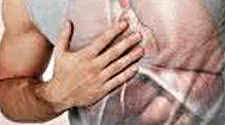Health Study: Chest Pains - Symptoms, Causes and Solutions

Advanced Overall Fitness Sciences & Compelling Research
Chest pains don't necessarily mean heart trouble. They can come from such sources as ulcers, hiatal hernias, gallbladder problems and Inflamed diaphragms. Your medical history helps in diagnosis. A lot of heart- related illnesses run in families. If a physician knows about these, he may be able to skip some costly and time- consuming tests.
CHOLESTEROL CONTROVERSY
Is cholesterol bad for us? The New England Journal of Medicine reports that increased cholesterol and fat In the diet definitely increase the risk for heart disease. However, the National Research Council hesitated to recommend dietary changes. The Framingham Heart Study feeds the controversy by suggesting that low levels of blood cholesterol may correlate with an increased risk of cancer.Accusations against cholesterol remain strong. Many studies have shown that blood cholesterol level is one of the surest predictors of coronary heart disease. High blood pressure and smoking Increase the risk. Researchers have found that many different animals develop heart disease when fed a typical American diet. 'Then placed on cholesterol- lowering diets or drugs, they have less heart disease. When ethnic groups that are relatively free of heart disease in their homeland move to areas where high-fat diets are common, they tend 'to acquire both the cholesterol levels and heart disease risk of the new culture.
Heredity can also be a factor. People who have heart disease early in life often come from families with high cholesterol levels or a history of heart disease. Studies show that cholesterol is always present in the walls of blocked coronary arteries. The circumstantial evidence is damning, but actual scientific proof is lacking. Existing studies seem to fall short of such proof.
AFTER THE HEART ATTACK
Back home after a heart attack or bypass surgery most men experience a lowered sense of self-esteem and a feeling of dependency. They often isolate themselves emotionally. These personality changes may lead to suicidal thoughts, sexual dysfunction and stress that may even trigger another heart attack.Despite a modem medical system that offers miracle treatments for heart problems, adaptation to post- heart attack life is generally left up to the patients. The doctor tells them they are going to be all right, but once the patients are on their own, fear, anxiety, depression, frustration, guilt, feelings of inadequacy and anger set in. A Southern California psychologist, Herb Budnick, PhD, a cardiac rehabilitation specialist, believes problems are often lust beginning when the patient gets home. He notes that emotional isolation quadruples the risk of another heart attack. The man's dependency may cause him to resent his overly helpful wife. She in return may come to consider her husband a burden.
Paul Thompson, MD, medical director of cardiac rehabilitation at Brown Universty's Miriam Hospital, notes that men lose a part of their self-image after a heart attack. He feels that an exercise rehabilitation program on a regular basis is the key to recovery. He suggests bodybuilding weight training as a way of restoring self- confidence through greater strength and a better- looking body.
SHELLFISH
Latest research shows that lobster, shrimp, crab and oyster are good for your heart. Grilled shrimp! Maine Lobster! Yum!HEALTHY HEART POINTERS
» If your total blood cholesterol is over 180, find out how much is HDL (high density-lipoprotein cholesterol), the good stuff. At least 25% of total cholesterol should be HDL.» Regular exercise can lower blood pressure, reduce bodyfat, lower cholesterol levels, prevent blood clots and stave off heart attacks.
» Eat fish at least twice a week. The unsaturated Omega-3 oil in fish lowers blood cholesterol.
» Eat plenty of fresh fruit and vegetables as well as grains and legumes. High in potassium and low in sodium, they help prevent hypertension and strokes.
» Be careful of alcohol. It can raise blood pressure and make the heart work harder, a real danger to the older person.
SMOKING
Regardless of the kind of cigarette smoked ("light", "ultra light," etc.), the risk of heart attack for smokers remains four times greater than for nonsmokers. Heart attack risk increases with the number of cigarettes smoked daily People who start smoking "light" cigarettes because they contain less tar and nicotine compensate by inhaling deeper and lighting up more often. This, in turn, increases the amount of carbon monoxide in the blood, which drastically limits the amount of oxygen delivered to the heart, making smoking a big contributor to heart disease.PREDICTING HEART DISEASE
Researchers have been studying three tests that can tell whether you are at risk for heart disease. The first is excess insulin in the bloodstream. Excessive insulin output can lead to high blood fat levels, which lead to blocked coronary arteries. The second is a blood test for creatinine. a by-product of muscle tissue eliminated from the blood by the kidneys. High levels of creatinine indicate kidney malfunction, which is usually associated with high blood pressure. High blood pressure, of course, can lead to stroke, heart attack and further kidney damage, if discovered early enough, diet and medication can decrease blood pressure and creatinine.causes fatty buildup in coronary arteries, but may interfere with the body's natural ability to dissolve blood clots. It is generally a blood clpt that finally blocks blood flow in a cholesterol- clogged coronary artery blocking blood flow to the heart. The problem with Lp(a) is that it is hard to distinguish from LDI cholesterol, but continued testing is promising.